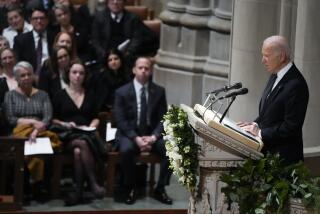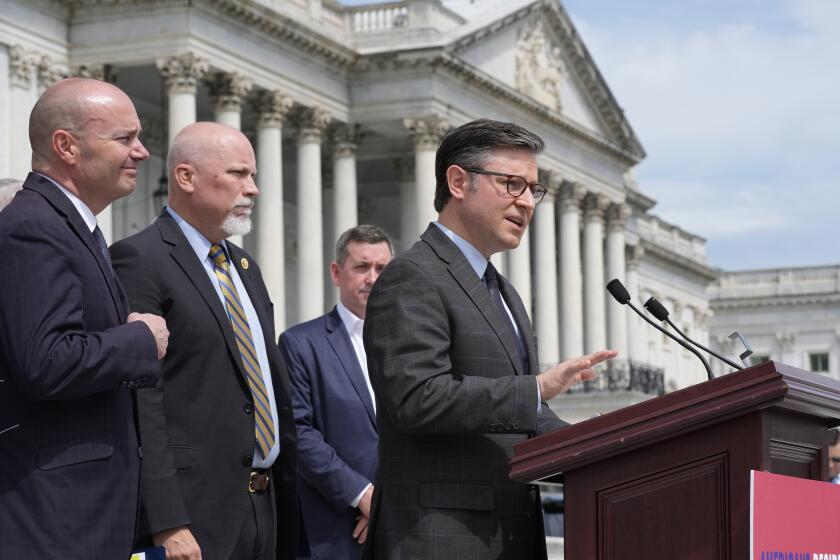Opinion: Supreme Court clerk isn’t a lowly position. It’s a pathway to power

The Supreme Court ended its 2018 term on Thursday. All nine justices, barring death or an unexpected retirement, will be back on the bench in October. But their most intimate advisors — their law clerks — will be a brand-new crew.
One of them, a clerk for Justice Brett M. Kavanaugh, is Yale Law School graduate Sophia Chua-Rubenfeld. Her selection has inspired something of a media pile-on, but also may prompt a serious debate about who gets to clerk (yes, it’s a verb) for the nation’s highest court.
Chua-Rubenfeld is the daughter of Yale Law School professors Amy Chua and Jed Rubenfeld. Chua, it was widely noted, had written an adulatory article about Kavanaugh last year as he was seeking Senate confirmation. She is also the author of the 2011 book, “Battle Hymn of the Tiger Mother,” a paean to high-intensity parenting.
Vogue headlined its story: “Tiger Mom Amy Chua Defended Kavanaugh — Less Than a Year Later, Her Daughter Got a Clerkship with Him.”
But there’s a problem with the insinuation that the clerkship for Sophia Chua-Rubenfeld was a payoff for a favorable op-ed written by her mother.
In that very article in the Wall Street Journal, Chua noted: “Last year my daughter accepted an appellate clerkship from Judge Kavanaugh, which was set to begin next month.” So, rather than a quid pro quo, the Supreme Court clerkship for Chua-Rubenfeld seems like a natural follow-up to his previous decision that she was clerkship material.
Still, that doesn’t mean the appointment can’t be questioned on other grounds — such as that it’s typical of an arguably elitist hiring process at the court.
I’m sure Chua-Rubenfeld is qualified for a Supreme Court clerkship. But as a graduate of Yale Law School (Kavanaugh’s alma mater), she also has the sort of educational pedigree that has proved popular with both liberal and conservative justices.
Not unlike the Supreme Court itself — five of whose members once clerked at the court — the roster of clerks is disproportionately drawn from Ivy League law schools. According to the website Above the Law, the crop of 41 clerks for the term that just ended includes 13 from Yale and 10 from Harvard. (Stanford Law School is in third place with five clerks.)
Actually, the clerks as a group are less dominated by Ivy League graduates than is the court. All nine justices attended law school at either Harvard or Yale. (Justice Ruth Bader Ginsburg started at Harvard and then transfered to Columbia Law School, from which she got her degree.)
The similar backgrounds of so many Supreme Court clerks surfaced as an issue earlier this year in an unlikely setting: a hearing by a House Appropriations subcommittee. Justices Samuel A. Alito Jr. and Elena Kagan were there to testify about the court’s budget, but one member of the committee, Rep. Sanford D. Bishop Jr. (D- Ga.), asked about the fact that few Supreme Court clerks are racial minorities.
Kagan, herself a former Supreme Court clerk and a graduate and former dean of Harvard Law School, said that progress has been made on increasing the number of minority and female clerks. But she added that “there are many different kinds of diversity,” including a diversity of educational backgrounds.
“When I wander around law schools,” Kagan added, “I hear more questions about the number of clerks that come from just a few schools than I do [about] almost anything else.”
Kagan certainly was right about gender diversity. In recent remarks at a judicial conference, Ginsburg said Kavanaugh had “made history” by hiring “an all-female law clerk crew” this term, with the result that there are now more women serving as clerks than men.
A diversity of educational backgrounds may prove harder to achieve, and not only because the justices doing the hiring themselves attended the most prestigious law schools and may identify with Ivy League applicants. There is a widespread assumption, and not just in legal circles, that a candidate with a degree from Harvard or Yale is automatically superior to someone educated at a less elite institution.
But the justices should question that assumption as relentlessly as they do the arguments of the lawyers who appear before them.
It’s partly a matter of equity and representation. Even if a Supreme Court clerk never becomes a justice — and the odds of any individual being tapped for a seat on the court are daunting — a clerkship is a pathway to power in the law and politics. It also may mean a bigger paycheck when an ex-clerk begins practicing law; some law firms reportedly pay former clerks hiring bonuses of $400,000. (An associate justice of the Supreme Court is paid $258,900 a year.)
But there may also be a benefit for the justices and for the law in casting the net more widely, to capture students who excelled at less celebrated law schools in the middle of the country. (And the same is true of the appeals court judges who serve as feeders of clerks to the high court.)
A law clerk’s principal duties are to do research and draft opinions. But the clerks, most of whom are recent law school graduates, also offer their cloistered jurists a window on the wider world.
This advantage is usually defined in generational terms — clerks in their early 20s are more likely to know about trends in technology than middle-aged or elderly judges and justices.
But it also could encompass different life experiences — such as that of someone from a blue-collar background who had a late vocation to the law and studied at the public institution nearest her home.
It’s unrealistic to expect the justices to “ban the box” on which applicants for clerkships indicate where they went to law school. But they can force themselves to look for promising applicants who check other sorts of boxes.
Enter the Fray: First takes on the news of the minute »
Follow the Opinion section on Twitter @latimesopinion and Facebook
More to Read
A cure for the common opinion
Get thought-provoking perspectives with our weekly newsletter.
You may occasionally receive promotional content from the Los Angeles Times.







